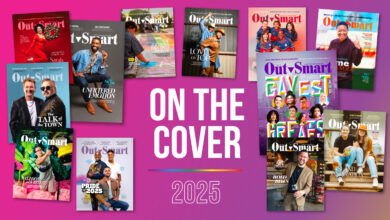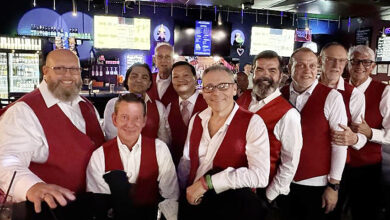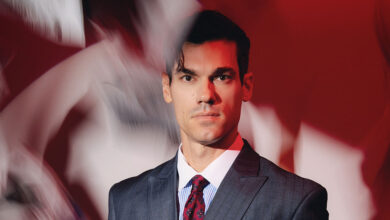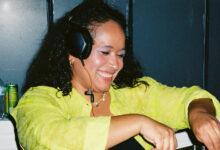Testify, Sister
Out singer Susan Werner releases The Gospel Truth. EXPANDED WEB INTERVIEW
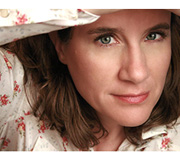
Out performer Susan Werner has been making a name for herself on the singer/songwriter circuit for some 15 years. The Iowa-reared, Chicago-based singer began her career in the folk/pop realm, with acclaimed discs such as Time Between Trains and New Non-Fiction, and then later, reinvented herself as a crooner of original standards on I Can’t Be New. On her latest CD, the groundbreaking The Gospel Truth (Sleeve Dog Records/susanwerner.com), Werner makes her boldest statement to date. The dozen songs (including a hidden track) capture the passion and praise-filled expression of spirituals and gospel music, but without the bible thumping. In fact, the subjects of the songs range from close-minded but loud-mouthed preachers in “(Why Is Your) Heaven So Small.” to random acts of kindness and generosity in “Help Somebody.” to losing one’s faith in “Lost My Religion.” to getting your fair share, regardless of your religious affiliation, in “I Will Have My Portion.” But what gives these songs their glow is the way in which they are delivered, with a thundering gospel choir or an organ or both.
Werner recently sat down for a breakfast interview at the bustling West Egg Café in Chicago before she headed out on tour, which includes the May 24-June 10 Kerrville Folk Festival in Texas Hill Country (she is scheduled to perform on May 28 and 29).
Gregg Shapiro: Your new CD The Gospel Truth addresses religion, but it’s not the first time that religion has appeared in a song of yours. I was thinking about “Sorry About Jesus,” a song from your 1998 album Time Between Trains.
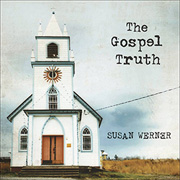 Susan Werner: Like many Americans I grew up in a church-going family. I think that stays with you whether you continue your parent’s tradition or depart from it, but it’s there. I think I finally reached a point in my life where, like a lot of people, I began to look for a sense of meaning, a sense of larger purpose, because I was happy in all other aspects of my life and I wanted to look for some way to be of larger service and feel like my life again had a larger purpose to it. So like many Americans I began to consider a return to the church. Evidently, I’m not alone in that, in going back to see what the church represents and if there’s a way I want to relate to that now. One way of looking at it is that it’s like going through childhood things and objects and deciding if you want to keep them or not.
Susan Werner: Like many Americans I grew up in a church-going family. I think that stays with you whether you continue your parent’s tradition or depart from it, but it’s there. I think I finally reached a point in my life where, like a lot of people, I began to look for a sense of meaning, a sense of larger purpose, because I was happy in all other aspects of my life and I wanted to look for some way to be of larger service and feel like my life again had a larger purpose to it. So like many Americans I began to consider a return to the church. Evidently, I’m not alone in that, in going back to see what the church represents and if there’s a way I want to relate to that now. One way of looking at it is that it’s like going through childhood things and objects and deciding if you want to keep them or not.
What to keep and what to discard.
Yeah. Which memories and experiences you treasure and know that you always will—they’ll always be a part of you—and which ones you’re happy to drop off at Goodwill and never see again. Another thing to say is, if your parents took you to church as a little kid, then that music is in your ears before you’re even old enough to articulate it. Your ears are tuned to that music. So if in later life, you depart from the church and become a secular American, your ears are still Catholic. [Laughs] My ears are still in some way Catholic and still part of the church. It’s been interesting to me to see how many other people have exactly these same struggles—how to integrate, really, how to integrate how they grew up with their adult selves. Religion is one place where that shows up with people. What’s interesting about this project is that music brings up memories. Music is more powerful than words. Music brings up things at a subconscious, nonverbal level both below and above what you can articulate in words.
It’s almost like the sense of smell.
Right. [Laughs] If we could make a smell album about gospel, about religion…Wow, that would be a trip, right? What would it have? Incense, Cheerios…
Yes, Sunday morning breakfast smells. In an e-mail, you talked about the research that you did for this disc, such as attending various church services and soaking up the proceedings. Christian music itself has also worked its way into pop music. Did you listen to this music as well or did you stick with the church-based stuff?
I did not listen to contemporary Christian pop, because I wanted to make many of these songs out of music of the church, if you actually went to a church. Which isn’t necessarily pop music—which is choirs, which is bluegrass gospel, traditional music of the church made with traditional elements, B3 organ, the choirs, hymns, biblical language instead of contemporary language.
It’s funny, because I was thinking about the song, “Loves Me Like a Rock” by Paul Simon. But here is this man of Jewish heritage backed up by the Dixie Hummingbirds singing in a gospel style. Yet it is the most unreligious song ever—it’s a pop song about love, but he makes those worlds meet.
Because it’s about love. I really admire Paul Simon’s career because he’s really been able to incorporate other musical languages into his song writing. When you do think about Ladysmith Black Mambazo…
Of course, all the South African stuff…
And the Dixie Hummingbird stuff. So my career is like Paul Simon’s career, except no one knows who I am. [Laughs] But that’s a good model for what it is that I’m doing with my career, going from style to style, but still it’s song writing—incorporating those original musical elements, those root elements into new songs. Let me say one thing about Christian elements in pop music. When I was a little kid, there were hits like, “Put Your Hand in the Hand of the Man”…
“…who stilled the water.” And “The Lord’s Prayer” was a hit single in the seventies, too.
This stuff! Think about Pete Seeger writing “Turn, Turn, Turn,” and the Byrds make it a hit. These are words from the book of the Ecclesiastes. “Jesus is Just Alright with Me”…
And the songs from Jesus Christ Superstar were all over the radio at that time as well.
There was this time before, and I think that there might be a parallel in that then, as now—we’re in the later years of a very unpopular and tragic war. It’s almost as if it’s time now for “nice Jesus” because the fire-and-brimstone daddy god got us into some trouble here and nice Jesus is going to get us out of it.
In the press release, you mention attending Chicago’s Gospel Fest with a Jewish friend who commented that he wanted to know where to find gospel’s “joy without the Jesus.” I’ve often wondered the same thing: why the same fervor and unbridled enthusiasm inherent in gospel couldn’t be put to better use, such as singing about guaranteeing a woman’s right to choose or the health benefits of vegetarian diet or some such.
[Laughs] This is a great question!
What you do is sort of throw it back at them with their own language and attitude. Was that particular moment at Gospel Fest the spark for you?
It was key. Standing there listening to the choirs—they made so much noise, so much volume, and intensity. And this is Millennium Park, and it was still loud. This was outdoors, and it was still loud as hell. And I had been to Blues Fest and Jazz Fest, all those, [but] this had something else going on. This was just fantastic and transcendent. I mean I was willing—you are willing to be converted. I think that the Chicago Gospel Music Festival is the best argument for God that I’ve ever heard. It still did not convert me, but it was the best argument I’d ever heard. It’s something to experience. I don’t know that you can get all the joy without the Jesus, but you can pull right alongside it and enjoy the feeling of being of service to other people, of anticipating that good things are coming. Hope, optimism—those are the sort of things you can get without God as the light at the end of the tunnel.
That joy, that emotion, that volume comes, in a large part, from having…
…a hundred people on stage.
Right. Having a gospel choir singing on the songs with you gives them a whole other level of authenticity. How did that come about?
My producer happens to run a studio in Philadelphia that does almost half of its business with gospel choirs and gospel musicians. Philadelphia is a hotbed of gospel music, and all these choirs and bands want to do a project out there. So in his Rolodex were all of these people, including the Wilmington Chester Mass Choir, which gets together a couple of times a year. He brought in 9 singers and they just multi-tracked everything so it sounds like there’s 40. We could only afford nine of them, and we made them work four times as hard. [Laughs] They did all the arrangements on the spot, right on the spot. They’d never heard the songs before, and they just came in and said, “Let’s do this. This sounds like this goes like this.” And to experience music making like that, sitting in the booth with everybody and they’re just singing back to what you laid down already as a vocal…To see people come up on the spot with a choral response to something you thought up in a song…I told my road manager, “This is like prom night to me. This is like the best night of my life.” Just to hear people amplifying whatever your vision was and amplifying it a thousand times of anything you could have ever dreamed of—because they enjoy music making like that…
Will there be a gospel choir presence when you perform these songs live?
This is, again, an example of where Paul Simon is Paul Simon, and I’m not. However, for about 10 dates this spring, I’ll have my bass singer and two women singers. So they’ll be doing all of the call-and-response parts. They’ll be doing the response, so I won’t just be calling out into the void. There will actually be people responding right on stage, which ideally will lead how many hundred people are in the room to respond along. So that is the investment I’m making, and I feel like I’m doing the work of God out here. [Laughs]
The Goddess.
[Laughs] Yeah, that’s one regret I had. I didn’t get a song written about God as a woman, I just didn’t get it done. I ran out of time.
Since we’re laughing here, humor plays an important role in a few of the songs, including “Probably Not,” “Our Father,” “(Why is your) Heaven So Small.” How important was maintaining a sense of humor throughout this project?
First of all, I should say, “Heaven So Small” is not necessarily funny as it is ironic. I was a little anxious about this project until the funny songs showed up because I felt like Now I can do this project. It did not feel like my project to do if it was so deadly serious, because to me humor is the guarantee there is a human being at work in the writing of the songs, there is a human being at work in the performance of the songs. If there’s no humor in the project, I distrust the thing. I run screaming from something where there’s no funny at all. Also, with humor you can say something—this is a cliché—but sometimes you can say something more serious than with the serious. But “Probably Not” admits that we’re kind of scared to find out there ain’t nothing. What if you die and there really ain’t nothing? It’s kind of a bummer. And then are you there to experience the bummer? I’m not sure, but it’s a bummer. And what if you bet wrong and you get up there and you’re like “Ugh, damn”? Damn, man.
Damn, I’m damned.
Exactly. Damn me. [Laughs] It enables people to laugh about it. To hear people laugh about it is a huge relief. But first when I sing “Probably Not,” it’s interesting to see the audience because some people really laugh, and others—their face falls like “You just took my candy away. Man, I’m bummed, and you’re bumming me out with this.” But when the song turns, they cheer up. [Laughs]
There is also a serious side as can be heard on “Help Somebody,” “Sunday Mornings,” “Trouble Me,” “I Will Have My Portion.” It’s political and personal, and it just ties those things in. Did those songs come naturally or was there struggle with them?
The only song I really struggled with was “Sunday Morning,” and I knew it was important when I began writing it because I had wondered all along what is going on with this impulse to do this project, what is going on with this. Inevitably there is an autobiographical component. I’d love to push the whole thing out into the external world, and I think that the record will do its own work in terms of songs that mean a lot to other people without me revealing too much or making the song too much about myself.
This song seems to really ground the project. This is for real. There is something intensely personal at risk here, something invested here. I struggled with what the middle was. I couldn’t figure out how I wanted to get from being a little kid going to church with my parents to being an adult who doesn’t go to church and what’s in the gap. What’s in the gap, you’ll hear in the bridge of the song, is experiences that I saw, especially with my brother, where something didn’t fit, something just didn’t fit, and something still doesn’t fit.
So I solved the song that way emotionally. Musically, I didn’t know what the bridge was going to do, and I was listening to some Sufjan Stevens. In his songs he does unexpected things harmonically. They take these sort of journeys in the middle of the song. He’ll just go off to like Mars and come back. And I realized if the song took some harmonic tangent there, that would help make you feel the strangeness of that moment in the song. So whenever I meet Sufjan, I’ll have him to thank for that.
In keeping with the serious subject matter, the song “Forgiveness” is especially powerful, and I wondered if your being a member of the GLBT community played any part in your need to address the hypocrisy of organized religion, particularly in light of the Christian right’s crusade against queer people?
The lines “How do you not hate those who have low to their bibles and armed to their disciples,” it does feel like the conservative church has had it in for certain populations, in the last several years especially. The song started out coming from there. Now I’ve found that you can telescope back from the song and get to an even broader point with it, which is that the planet has Muslims pointing guns and bombs pointing at Christians, and Christians pointing guns and bombs at Muslims, and Jews pointing guns and bombs at Muslims, and Muslims pointing guns and bombs at Jews. The Middle East is the primed for bad things to happen any day, every day. So the song starts more local and personal and telescopes back to something larger and maybe even more deeply concerning. What I tried to do with “Forgiveness,” with “Heaven so Small,” and many of these songs is to use the music of faith with the lyrics of doubt, and in that contradiction there seems to be a lot of power. I don’t know why, but it seems like nobody’s tried it before.
The disc, like the music on which it is based, is ultimately infused with hopefulness, which comes through especially on the untitled bonus track, functioning as a sort of coda of hope.
I think we made it a hidden track because musically it’s different than the rest of the album. It’s almost like a theater piece. The piano parts and how it’s written is more like a piece for the stage than a gospel piece.
It reminds me of a Carpenters song.
Well, sure. Right, okay. I know what you mean. [Laughs] It’s a song that talks about the after life. You’d put that as a hidden track, right, because maybe there’s a surprise. Let the disc run, and maybe there is something there. Let your life run, and maybe you’ll bump into something. But the song balances the hope for something with the expectation that there isn’t but I’m willing to be surprised. And I think that’s something that, when I sing the song, it seems to resonate with people. Many of us have enjoyed our lives. We don’t want to give it up. I don’t think anyone wants to give it up. If you’ve had a good life at all, you don’t want to hand it over when it’s your time, and that, I think, is part of what hope for an afterlife is all about.
“Oh man, I love people so much. I enjoyed where I live. I enjoyed a walk by the lake. I enjoyed music so much. Wouldn’t it be great to see everyone I love, to experience the pleasures of a great glass of wine, a great bottle of wine, my dear friends, my parents?” We really wouldn’t want to give it up. It’s the hope for something, a reunion of sorts, even though many of us suspect that there isn’t—but wouldn’t it be great? And, boy I’d love to be surprised. I think that’s very human to say, “I’d love to be surprised.”
Your previous album I Can’t Be New was a collection of originals written in the style of standards, and your new disc, The Gospel Truth, is a set of originals in the gospel style. Does this qualify as a trend?
I like the challenge of themed projects. I like the challenge of it. I think that my earlier recordings were almost like a painter in their earlier years. They experiment with all kinds of different styles, and in their middle and later years they return to styles that engage them and that seemed to show their talent both. So I see ahead a covers project. I see ahead that I am going to write a show or two. I’d love to do a foreign-language project. I’d love to do a project that saves classical music from the “dust bin,” because the musical values of classical music, if you can enliven them, they’re so compelling. I’m just afraid it’s been increasingly marginalized.
Speaking of trends, The Gospel Truth is coming out at around the same time as Rickie Lee Jones’ “Sermon on Exposition Boulevard,” which also has a religious bent.
My impression is that for the moment, and everything goes in cycles, the weather will change in three more years. It seems as if right now the religious right and the secular left are having their say—that the religious right is waning in power for the moment and that the secular left fought hard to reveal what this war was and has now revealed what this war was. The secular left did a lot of the heavy lifting to reveal what went on with this war and this campaign—and a campaign to sell it. But now there is a coming together going on: How can we unite behind a common purpose? This is part of the excitement behind [Barak] Obama—that he represents this “Let’s all come together vibe” more than anybody else out there. He’s like “Let’s unite, let’s get some things done on behalf of everybody,” and he seems to know that this is a message that has great traction right now. People want to see us unite. It has resonance right now. If there’s something going on in other records you see, I think that there is a collective unconscious that’s gathering force and speaking out, and that’s what’s going on right now. We’ll see what comes up next.
Finally, The Gospel Truth is a self-released disc.
[Laughs] I didn’t even pitch it! I didn’t even pitch this to any label because I wanted complete freedom to do it. I didn’t even pitch it because having done how many albums now—this is my fifth national release—now I know how to do it. You hire a publicist, you hire a radio promotion person, and if you are willing to deal with the hassle you can own your own recording—which is important now, you own your own material. I don’t want to buy it back from someone else. I want to own it. So there were a couple of things going on. One, I didn’t want anyone else’s opinion to factor into how I wrote these songs or do this record. There was complete creative freedom with this project. Two, if it goes well, there will be nobody happier than me who took a risk financially and creatively. It’s a good moment to be able to do it. You have to purchase your own freedom. I purchased my own freedom with this thing. It feels great to have had the liberty to do it.
Gregg Shapiro is a past recipient of the annual OutMusic award that recognizes contributions by non-musicians in furthering the work of GLBT performers.




